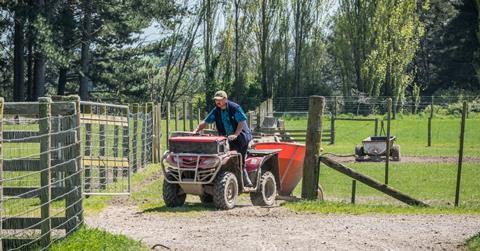New Zealand government initiative aims to raise awareness of country’s highly innovative agritech sector and support UK farmers as they transition to environmentally based support payments post-Brexit

New Zealand Trade and Enterprise (NZTE) has launched a campaign to offer advice and help British farmers negotiate changes to the way the UK farming sector is funded.
The government agency is responsible for promoting economic development and trade in New Zealand and has developed the campaign to raise awareness of the country’s highly innovative agritech sector.
It wants to show how it can support and benefit UK farmers as they transition to environmentally based support payments post-Brexit.
The campaign offers five downloadable guides covering a range of topics including farm business management and machinery.
The guide includes insights from industry experts, advice and recommendations on how to build efficiency and resilience into a farm business, information on the latest technologies, and case studies to demonstrate how these innovations are making a difference on farm.
Trade commissioner for NZTE, Joe Nelson, said: “With the transition from BPS to environmentally led support payments, it is likely British farmers are going to need to take significant strides in becoming more efficient and more profitable in their farm businesses to ensure they are viable in the long term.
“In many cases, this will require a much greater adoption of technology, both on farm and in the management of the business.”
He emphasised how the guides had been created to help UK farmers gain a better understanding of the agritech routinely used in New Zealand and how it could drive efficiency, profitability and resilience in their own businesses.
Nelson continued: “Thankfully, a major precedent already exists that demonstrates life after subsidies is not only possible to achieve but can help farm businesses to become more successful, profitable and sustainable.
“This is the story of New Zealand agriculture, which receives no government funding at all, yet is buoyant, successful, and efficient – not to mention one of the largest exporters of agricultural products in the world.
“In producing these guides, we are providing an in-depth look at the types of technologies that have been used to achieve this and how relevant they are to what is happening in the UK right now. Hopefully, they will give UK farmers a sense of what is possible and how technology can really transform a farm business.”
CEO for Agritech New Zealand, Brendan O’Connell, commented: “Farmers in New Zealand have a very pragmatic attitude. They have a high tolerance to try something new if it will make their business more productive and profitable.”
O’Connell added: “The first 12-15 per cent to adopt it are the trail blazers, but after that we have what we call the ‘persuadables’. These represent 30-40 per cent of the market.
“They’re very open to tech if it is fit for purpose and once they see something works, they’ll invest.”



